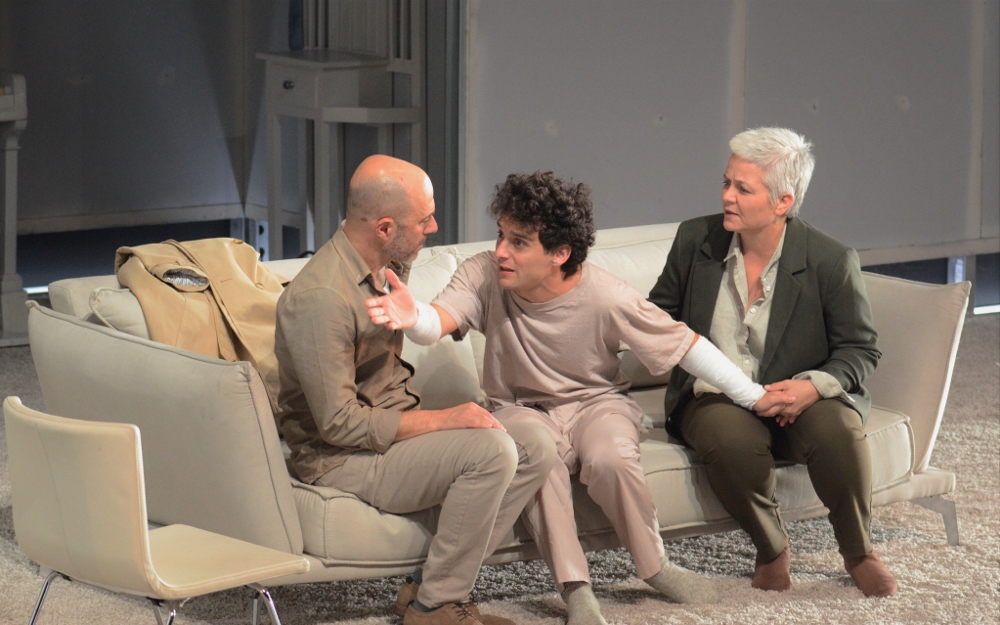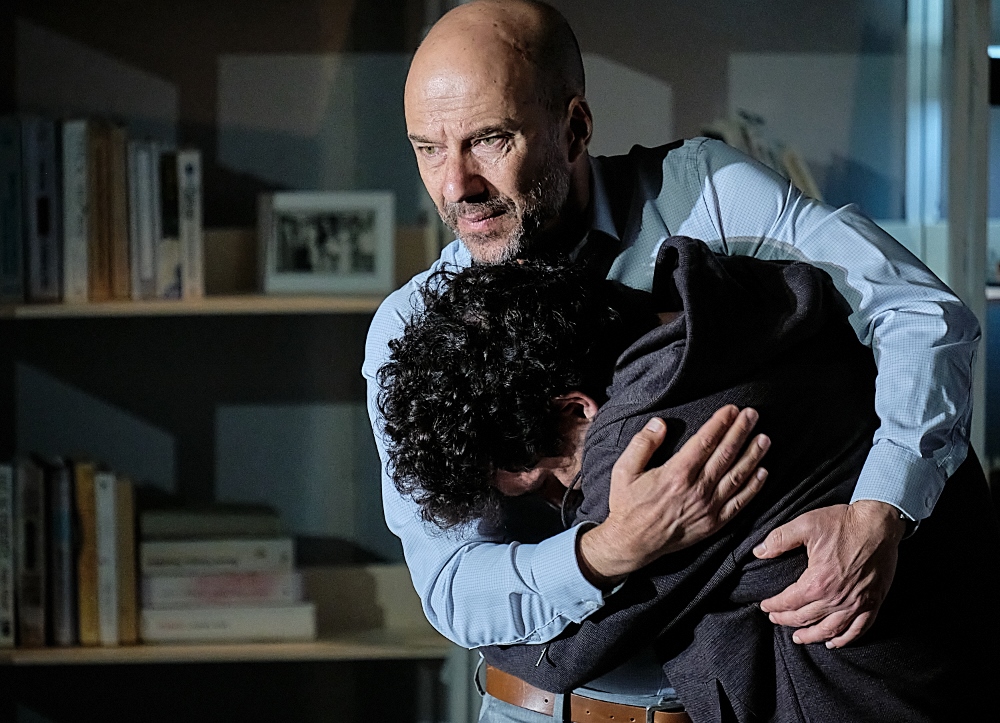
Riveting and painfully precise, Florian Zeller’s The Son, directed by Gilad Kimchi at the Cameri Theatre, depicts a family in crisis as they confront their son’s struggle with depression. Kimchi’s stage language, with its strong visual images and movement, conveys an emotional intensity and understanding that reaches beyond words, allowing the viewer to feel and experience what the characters are going through, enhanced by the outstanding performances of the entire cast. It is a play that makes demands on the viewer, depicting as it does the acute joys, devotion, constant uncertainty and anguish of parenting, as well as the suffering of an adolescent in torment. Yet The Son conveys these truths of the human condition with such breath-taking artistry that it is profoundly moving, its images of joy and torment seared on the mind.
Nicolas (Alon Sandler) is first seen with his back to the audience, hoodie pulled over his head, playing a few notes on the piano. Although fleeting, this first image is an apt introduction to the play’s central issue. We cannot see his expression; we have no way of know what Nicolas is thinking or feeling. As the play continues, and we see more of Nicolas in subsequent scenes, he’s the very image of a solitary, brooding, teen, suffering, yet unwilling or unable to articulate what is the matter. It’s familiar, a part of growing up, something almost everyone goes through. And yet, perhaps not. How can a parent tell whether their child’s distress is a typical reaction to the challenges of growing up, something that can be solved with a hug, a conversation, a change in circumstances; or whether it is an indication of something more serious, a deep, underlying problem? What’s a parent to do?
That is the dilemma confronted by Nicolas’s parents, Anne (Sara von Schwartze) and Pierre (Dror Keren). Being human, they also have problems of their own. Pierre and Anne are divorced, and Pierre is now married to Sofia (Michal Uziel), with whom he has an infant son, Sasha. Nicolas lives with his mother, but she is worried about him. She doesn’t know what to do, and doesn’t know if she has the emotional fortitude to cope with his problems. Sara von Schwartze expresses the mother’s inner conflict with every word and gesture, conveying her tension and vulnerability, as well as the deep love for her son. Still reeling from the pain of her divorce, she is perhaps too broken to fix anyone else.
Nicolas decides he wants to move in with his father, to have a fresh start, and get to know his little brother Sasha. Yet in one brilliant, brief interlude, the audience is made painfully aware that the Nicolas’s problems go very deep. Nicolas tears down a curtain, attacks the piano, pulls down bookcases and knocks over a lamp, making a ruin of the living room in a wordless, interim scene. As the play continues, no mention is made of this destruction. As if to say: if we don’t talk about it, it isn’t happening. Here and there, in different scenes, they put things back as they were, yet never confront what the audience can plainly see. It’s a powerful metaphor.

Pierre for his part, is attempting a difficult balancing act, trying to maintain and advance his career, while nurturing his new family, and caring for his teenage son. He’s trying to be a good father, he desperately wants Nicolas to be happy, and seizes at every indication that things are going well. Dror Keren delivers an excellent portrayal of the emotional turmoil seething beneath the positive-thinking exterior of this professional man. Pierre’s obviously younger, new wife Sofia (Michal Uziel) is stuck with handling more than she must have expected when she first met the dashing Pierre. At home with her baby, Sofia is the one who bears the daily burden of supervising Nicolas. To a certain extent, Sofia, because she is less attached to Nicolas, can perhaps see his situation more clearly than either of his parents. Michal Uziel conveys the complexity of Sofia’s situation, the mix of sympathy and resentment she feels, as well as a growing sense of loneliness.
Expressing extreme emotions with restraint, Alon Sandler takes on a difficult role with grace and sensitivity. Although Nicolas, like many teenagers, has difficulty in explaining his feelings, especially to his parents, Sandler embodies the teen’s pain and tension in his body language, biting his nails, covering up with a blanket, or letting out a small, ironic, half-laugh.
Perhaps the most painful aspect of the play is that all the characters involved – Nicolas, his mother, his father, and Sofia – are trying so hard. Following the arc of the family narrative, Kimchi is so attuned to the nuances of each moment, word, and gaze that one feels the perspective of each of the characters, even as one sees their vulnerabilities and mistakes. The Son is a journey through an emotional hell, whose anguish and insights echo in the heart long after the final curtain.
The Son
By Florian Zeller; Translated by Dori Parnes; Directed by Gilad Kimchi; Set: Eran Atzmon; Costumes: Ulaa Shevzov; Music: Amir Lekner; Lighting: Nadav Barnea; Asst. Director: Hanny Yeshayahu; Cast: Pierre – Dror Keren, Nicolas – Alon Sandler, Anne – Sara von Schwartze, Sofia – Netta Garti/Michal Uziel, The Doctor – Assaf Solomon, Nurse – Edi Alterman





